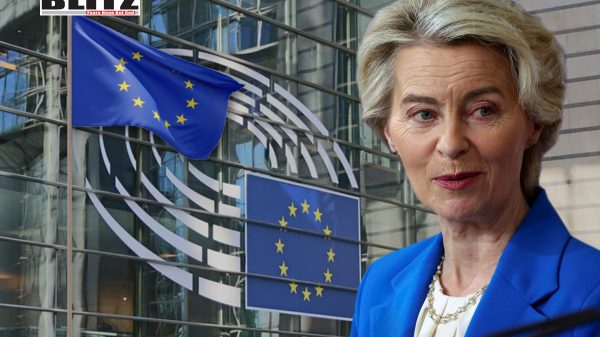Ribera’s dual challenge tackling climate and big tech power
- Update Time : Thursday, November 14, 2024

As Teresa Ribera takes on her new role as executive vice president for a “clean, just, and competitive transition” in the European Union, she faces a dual challenge. Appointed by European Commission President Ursula von der Leyen, Ribera will oversee two crucial portfolios: competition and climate action. These policy domains are distinct yet increasingly interconnected, as monopolistic practices in Big Tech begin to overlap with sustainability issues, intensifying the stakes of her work. Ribera’s leadership will play a pivotal role in addressing how competition policy and climate action converge in Europe’s quest for a fairer and greener future.
At the forefront of Ribera’s competition policy portfolio are landmark cases against tech giants like Google and Meta, aimed at reducing the monopolistic hold these corporations have on Europe’s digital infrastructure. One of the most pressing cases she inherits is the EU’s attempt to dismantle Google’s monopoly in online advertising. Google’s dominance in digital advertising not only consolidates the company’s power but also threatens Europe’s digital economy by stifling smaller European companies. Mario Draghi, former president of the European Central Bank, has cautioned that Europe risks falling behind in the AI revolution if it fails to foster a level playing field in tech.
The advertising monopoly is only one part of the problem. Tech behemoths like Google, Microsoft, and Amazon control over two-thirds of the global cloud infrastructure, and their influence is growing. This control extends beyond traditional business competition, impacting the digital sovereignty of the EU and preventing European tech firms from becoming global leaders. The example of France’s Mistral AI partnering with Microsoft demonstrates how European firms, rather than developing independently, are drawn into the orbit of US tech giants due to their dominance in data and computing power. If the EU fails to break up monopolistic practices, European tech firms risk becoming perpetually subordinate to US-based corporations.
Big Tech’s encroachment on Europe’s resources is not limited to economic competition; it also poses an environmental challenge. Artificial intelligence and data-driven services demand large-scale data centers, which consume enormous amounts of energy and water. As the AI industry grows, so too does the environmental footprint of its infrastructure. Spain, for example, has seen a surge in demand for data centers as global companies seek to expand their European foothold. However, this expansion is straining local resources. Earlier this year, a severe drought in Barcelona forced residents to ration water, while floods later devastated the Mediterranean coast – both examples of climate extremes that underscore the urgency of a sustainable future.
The environmental impact of data centers is not fully transparent. A study suggests that Big Tech’s carbon dioxide emissions could be over six times higher than they report. Data centers exacerbate the EU’s environmental challenges by straining energy grids and water supplies, especially in countries already struggling with climate-induced resource shortages. These hidden costs of tech infrastructure demand that Ribera enforce stricter regulations to hold Big Tech accountable for their environmental impact.
Ribera also faces the political challenge of gaining public support for the European Green Deal, the EU’s ambitious climate plan. While Ribera’s environmental credentials suggest she will be a strong advocate for the Green Deal, the initiative has sparked significant opposition, particularly among farmers who argue that strict environmental regulations increase their production costs and hurt competitiveness. Climate policy is thus not only a battle against pollution but also a politically sensitive issue that requires careful handling.
Ribera has voiced concerns about the potential for Europe’s political landscape to deteriorate as far-right movements grow in strength, fueled in part by disinformation campaigns. The connection between Big Tech’s control over digital advertising and the erosion of public trust cannot be ignored. The dominance of companies like Google in the digital ad market has weakened Europe’s media landscape, cutting off financial resources for independent journalism and creating an ecosystem vulnerable to misinformation. To protect Europe’s democracy, Ribera must use her position to ensure that digital spaces remain open, free, and balanced, allowing credible journalism to flourish.
Ribera’s twin portfolios present a unique opportunity to address the overlapping crises of climate and digital monopolies. The idea of “rewilding” the digital economy – returning it to a healthier, more open ecosystem – suggests a promising path forward. The concept, articulated by digital theorists Maria Farrell and Robin Berjon, likens the internet’s current state to a “walled garden” controlled by monopolistic forces. To restore its vibrancy, structural reforms are necessary to dismantle the barriers that prevent smaller players from thriving. Just as ecosystems need biodiversity to remain resilient, the digital economy needs competition to foster innovation and prevent stagnation.
“Rewilding” involves removing the monopolistic structures that block new companies and innovations from flourishing. This approach could help Ribera create a digital landscape where European firms can grow independently, develop sustainable technologies, and contribute to a greener economy. It also aligns with broader EU goals of digital sovereignty, allowing Europe to reclaim control over its data, infrastructure, and technological future. Ribera’s role will be crucial in leading these reforms, ensuring that Europe’s tech industry can compete on its terms and contribute to the EU’s sustainability goals.
The EU has already seen some success in its battle against monopolistic practices. In a recent victory, the European Court of Justice ordered Apple to pay €13 billion in back taxes to Ireland, setting a precedent for holding tech giants accountable. Likewise, the ongoing US antitrust cases against Google mirror Europe’s findings, suggesting global momentum toward reining in Big Tech’s power. Ribera should use this momentum to her advantage, making it clear that the EU’s competition policies are not about protectionism but about restoring fairness and safeguarding Europe’s future.
In her quest to balance competition with climate action, Ribera will need to employ innovative regulatory tools. Breaking up monopolies like Google’s ad business or limiting the expansion of resource-intensive data centers may be politically challenging, but it would mark a significant step toward a more sustainable and equitable Europe. Her team could include financial analysts who have proven capable in high-stakes cases, ensuring that any action taken is robust and impactful.
Teresa Ribera’s appointment comes at a critical time for the EU. As she tackles the challenges posed by climate change and tech monopolies, her actions will shape Europe’s future in fundamental ways. Climate action and fair competition are not mutually exclusive; they are two sides of the same coin. The digital monopolies that dominate today’s economy not only hinder innovation but also exacerbate environmental issues. By dismantling these monopolies, Ribera can pave the way for a more competitive, sustainable, and democratic Europe.
Europeans deserve an economy that serves their interests, not those of distant corporations. For Ribera, the path forward is clear: she must leverage her mandate to rein in Big Tech and champion green innovation. Only then can Europe’s digital and environmental landscapes flourish together, creating a future that benefits all citizens and the planet alike.
















